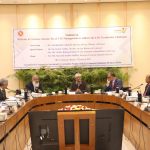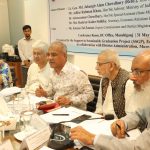Bangkok, 21 April 2025: Adopting the ‘Three Zeros’ approach could provide effective solutions to the urbanization challenges across the Asia Pacific– experts said at a side event organized during the 81st Commission Session of ESCAP held today in Bangkok.
Speaking on the occasion, they also called for prioritizing investments in affordable housing, essential urban services, urban innovation hubs, and social businesses.
Equally important is the development of reskilling and upskilling programs to prepare the workforce for a just transition aligned with the ‘Three Zeros’ vision—they said during the event titled ‘Sustainable Urbanization through Three Zeros: Transforming Cities for a Resilient Future’.
The Government of Bangladesh organized the side event with support from Support to Sustainable Graduation Project (SSGP) of Economic Relations Division (ERD).
The event was graced by the presence of Hon’ble Special Assistant (State Minister) of the Ministry of Finance Dr. Anisuzzaman Chowdhury. Executive Secretary of ESCAP H.E. Ms. Armida Salsiah Alisjahbana; Secretary of the Economic Relations Division Mr. Md. Shahriar Kader Siddiky; and Ambassador of Bangladesh to Thailand and Permanent Representative of Bangladesh to ESCAP H.E. Mr. Faiyaz Murshid Kazi were also present during the event.
The side event explored the integration of the “Three Zeros” vision—Zero Poverty, Zero Unemployment, and Zero Net Carbon Emissions, championed by the Hon’ble Chief Adviser Dr. Muhammad Yunus—into sustainable urban development, especially for graduating LDCs.
Speaking on the occasion, Dr. Anisuzzaman Chowdhury observed that sustainable urbanization is not merely an urban related issue. Rather, he opined that it is a far-reaching topic encompassing climate change, resilience and sustainable development.
Dr. Chowdhury also affirmed that ensuring sustainable urbanization requires visionary leadership, empowerment of citizens and adoption of a whole-of-society approach.
Executive Secretary of ESCAP H.E. Ms. Armida Salsiah Alisjahbana affirmed that adopting the ‘Three Zeros’ approach could provide effective solutions to the urbanization related challenges faced by cities across the Asia Pacific.
She observed that realizing such vision would require adequate investment in affordable housing and basic urban services. She also underscored the need for promoting urban innovation hubs, supporting social businesses as well as devising reskilling and upskilling programs to prepare the workforce for this transition.
ERD Secretary Mr. Md. Shahriar Kader Siddiky opined that achieving the vision of Three Zeros will require not just national commitment but also strong regional cooperation among the governments, multilateral institutions, civil society and private sector.
He put emphasis on enhanced financial resources and technical cooperation from both bilateral and multilateral partners of the region for sustainable urbanization.
Additional Secretary of ERD Mr. A H M Jahangir and Professor of BRAC University Mr. Iftekhar Ahmed delivered the keynote presentation of the event.
The keynote presenters explained, in detail, the linkage between sustainable urbanization and the ‘Three Zeros’. Major sustainable urbanization initiatives in Bangladesh and notable policy interventions from the government are also highlighted in the presentation.
Head of Economic Cooperation Department of the Ministry of Foreign Affairs of the Republic of Azerbaijan Mr. Elmar Mammadov; Chair of the Asian Coalition for Housing Rights Ms. Somsook Boonyabancha; Secretary General of the United Cities and Local Governments Asia Pacific (UCLG ASPAC) Ms. Bernardia Chandra Dewi; and Regional Governance Advisor of UNDP Ms. Diana Torres spoke during the event as panelists. Head of Sustainable Urban Development unit of ESCAP Mr. Omar Siddique moderated the panel discussion.
Panelists underscored the need for inclusive urban systems, regional cooperation, community-led initiatives, and enhanced financing.
Key recommendations emphasized visionary leadership, participatory planning, investment in resilient infrastructure, adoption of green technologies, and alignment with regional efforts such as the MAP Declaration for Resilient and Healthy Cities.
The event came up with a call for strengthened multi-stakeholder partnerships and actionable policy frameworks to drive sustainable urban transformation across the Asia-Pacific region.





